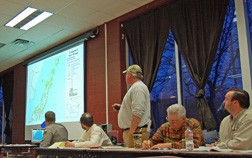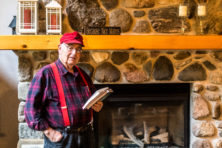Deer Hunt Changes Outlined
- Share
- Tweet
- Pin
- Share

Changes to 2014 deer hunting regulations were outlined during the annual spring County Conservation meeting held at Sturgeon Bay High School for Door County residents and in 71 other locations in each of the counties on April 14.
Chris Kratcha, Wisconsin Department of Natural Resources Warden for Southern Door, explained to those in attendance that most of the changes were a result of the recommendations from Texas researcher James Kroll, who was hired in 2011 to examine deer hunting practices in Wisconsin.
Perhaps the major change was reducing the number of deer management units from 134 to 72 county-based deer management units.
Bow hunters now have the option of using compound bows or crossbows. They can purchase an archery license for one bow style and upgrade to the second style for another $3. The archery season runs Sept. 13 through Jan. 4, 2015.
The protection of white or albino deer has been reinstated. They had been fair game in the 34 CWD-affected counties.
All legal firearms can be used during the statewide nine-day gun-deer season, Nov. 22 – 30.
The statewide youth gun hunt is scheduled for Oct. 11 – 12.
The hunt for hunters with disabilities is scheduled for enrolled properties on Oct. 4 – 12.
The statewide muzzleloader season is set for Dec. – 10.
The December antlerless-only season runs Dec. 11– 14, but only in the Central Farmland (Door County is in this zone) and Central Forest Zones.
The antlerless-only holiday hunt is set for Dec. 24 – Jan. 1, but only in the Southern Farmland Zone.
For more details, visit dnr.wi.gov/topic/hunt/regulations.html.
The DNR reported that more than 7,000 people came out to participate in the 2014 Spring Fish and Wildlife Hearings and Wisconsin Conservation Congress county meetings that were held in every county.
Statewide hearing results and the questions are available on the DNR website – go to dnr.wi.gov and search “spring hearings.”
Meeting results, along with written comments on the evening’s questions and DNR recommendations are used to advise the state Natural Resources Board. This year’s results will be reviewed at the board’s May 28 meeting in Green Bay. Votes are non-binding and are presented to the Natural Resources Board as advisory.

